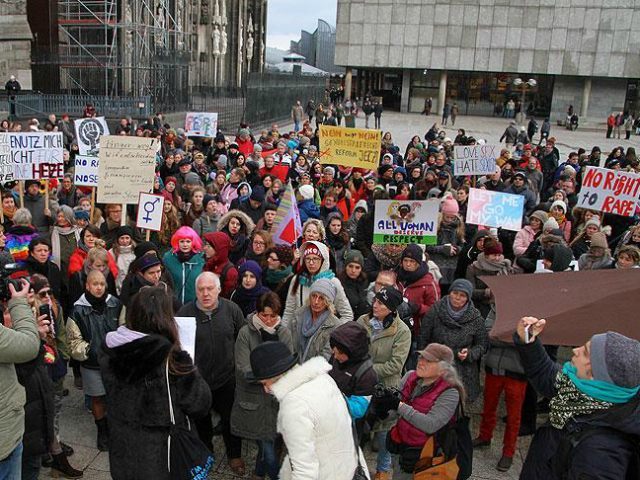The kind of political correctness that often infiltrates news stories in America is even more common in Germany where public broadcasting rarely criticizes the open-door immigration policies of the center-left government.
Media bias is a serious problem in Germany even though journalists there, as here, often deny or rationalize it. Looking back on the events in Cologne on New Years Eve, it’s easy to take for granted that the story is worthy of international coverage. But despite the unprecedented scale of the attacks, it took the story nearly a week to break through the German media’s wall of political correctness on immigration.
Politico’s European edition published an enlightening story Wednesday which demonstrates the German media’s ability to rationalize almost anything in defense of the current government’s open-door immigration policy:
“In all likelihood, the people behind this have been here for a long time,” left-leaning daily Süddeutsche Zeitung declared in its lead editorial a week after the attacks.
In other words, just as with the terror attacks in Paris, the culprits in Cologne were most likely homegrown “foreigners.” The real problem, the paper concluded, was likely “failed integration” — German society’s failure to assimilate foreigners.
Just hours after the article appeared, a police report on the assaults surfaced, revealing that many of the suspects were, in fact, refugees.
It’s not just the left-wing news outlets that appear eager to downplay stories about immigrants behaving badly. One of Germany’s public television reporters admitted on radio recently that the station takes a pro-government stance on immigration:
Hans-Peter Friedrich, a former interior minister under Angela Merkel, accused the public broadcasters of operating a “cartel of silence.”
“There’s suspicion that they believe they don’t have to report on such assaults, especially involving migrants and foreigners, for fear of unsettling the public,” he said.
Following Friedrich’s critique, a freelance reporter for German public broadcaster WDR told a Dutch radio program that she and her colleagues were obliged to toe the government’s line on the refugee crisis. “We’re a public broadcaster and are therefore expected to approach the problem in a more positive way,” Claudia Zimmermann, the reporter, said.
The reporter has since retracted those comments, but there’s no mistaking the German media’s tendency to downplay, or outright omit, coverage of crime which involves immigrants:
The alleged gang rape of two teenage girls in southwest Germany on New Year’s Eve by four Syrian refugees was not reported by any of the main news programs, for example, despite the parallels to the attacks in Cologne and other cities.
SWR, the regional public channel, reported on the rapes but was quick to add: “The nationality of the suspects played an ‘insignificant role’ in the crime, investigators and prosecutors said.”
ZDF, Germany’s other major public broadcaster, kept the mass sexual assault in Cologne out of its evening news broadcast even after it broke through and became national news. The station’s editor later apologized saying, “It was an failure.” Similarly, a prominent German news anchor also had to apologize after suggesting on air that critics of Chancellor Merkel’s open-door immigration policy were xenophobes.
It took an event of such complete chaos—that hundreds of women have filed police reports about being groped and, in some cases, raped by immigrants—to finally breech the German media’s wall of silence. Breaking down that wall had a follow-on impact in Sweden where police finally revealed similar attacks on women had taken place at an outdoor concert that took place in Stockholm last year.
The irony here is that the leftist media’s attempts to hush up these incidents may be feeding the growth of anti-immigrant movements more than simply reporting honestly and fairly would. Germans who see their media and their government dealing honestly with the real problems created by mass immigration are likely to be more tolerant than those who suspect, with good reason, that they are being lied to on a daily basis.

COMMENTS
Please let us know if you're having issues with commenting.